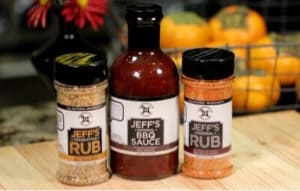Being a victim of the TV of the 60's, I have a very jaundice eye when it's on the telly. Just because it's on national TV does not validate it. And known human toxin's in the right quantity and under rigid controls actually become life saving medicine. So, your point is what? If you want to sponser the "old techniques" that may have existed before curing salt and refrigeration was available, you go first. I'll stick to what's been tested to death and found to be adequate when used as directed. Safety is number one in my life, whether it's on the job or in the kitchen. I can't afford to "EXPERIMENT" or keep an open mind when my family or guests are enjoying my efforts. TV stars and supposed gurus come and go with the rapid change of what's relevant or trendy nowadays, my family does not. And that, my fellow smoker, is what's important.
I have a strong hunch I didn't get my point across very well.
I didn't mean to imply that just because it's on TV it's valid. What I tried to get across is that using salt is a tried and true method of curing meat and has been for ages, and given the proper precautions it is an acceptable method and not just because Alton Brown said so. In bringing up the fact that it was on TV(on the Food Network), I was saying that given the type of network it is, they would have insured that it was a safe method of making bacon, prior to making and airing that episode, after all, the last thing they want is a bunch of lawsuits because people got sick.(I would hope!)
Having said that, I need to add that I'm new at this curing meat thing, and I'm trying to find out as much as possible. Thing is, in doing some searching on the internet I'm seeing all sorts of different ways to cure(almost information overload), so when I see answers like "You have to use curing salt" or "You don't have to use curing salt, because that's used in commercial establishments because so many people handle the food..." I get confused. Especially, since my parents never used curing salts making hams, sausages, bacon etc when I was growing up. They used to get a whole pig in Nov, Dec, and make all this stuff and I grew up eating it without getting ill.
This is in no way meant to dismiss the need for food safety, and regulations, but I tend to believe that they don't need to be applied in all situations. Let me explain; Typically we tend to go to a supermarket, box store, etc to buy our meat. We have no idea where this meat came from, or how it was raised, slaughtered, packed, shipped, stored, etc...Food regs definitely come into play. However, what if that same piece of meat came from a place where you knew exactly that it was raised in a healthy manner, without antibiotics, hormones etc. It was also slaughtered properly, and stored properly, then you picked it up, got it home and have taken the best possible care prior & during cooking. Perhaps in this case following the food safety regs to the letter may not be necessary for the food to be safe.
@Bearcarver;
When I said "curing" I meant it in the dictionary definition of the word.
This from Webster;
: to prepare or alter especially by chemical or physical processing for keeping or use <fish
cured with salt>
From Oxford; preserve (meat, fish, tobacco, or an animal skin) by salting, drying, or smoking:
On a few other sites, I have learned that the term "curing" literally means preserving food, it is generally accepted that in regular usage it refers to using "nitrates/nitrites"
I hope this post helps explain where I am coming from.
Thanks
Darko




